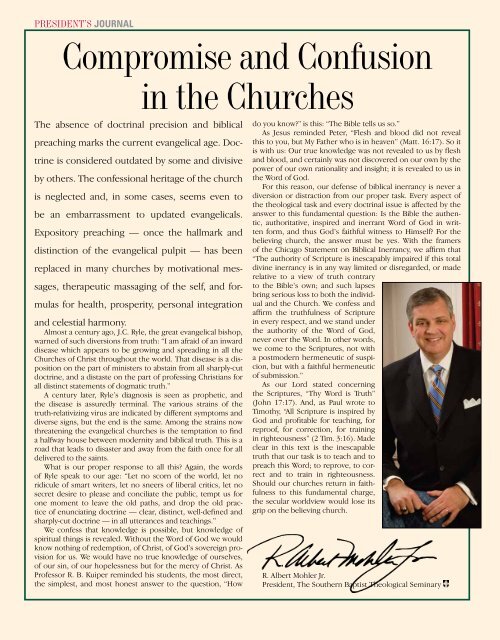Here - Southern Baptist Theological Seminary
Here - Southern Baptist Theological Seminary
Here - Southern Baptist Theological Seminary
You also want an ePaper? Increase the reach of your titles
YUMPU automatically turns print PDFs into web optimized ePapers that Google loves.
PRESIDENT’S JOURNAL<br />
Compromise and Confusion<br />
in the Churches<br />
The absence of doctrinal precision and biblical<br />
preaching marks the current evangelical age. Doctrine<br />
is considered outdated by some and divisive<br />
by others. The confessional heritage of the church<br />
is neglected and, in some cases, seems even to<br />
be an embarrassment to updated evangelicals.<br />
Expository preaching — once the hallmark and<br />
distinction of the evangelical pulpit — has been<br />
replaced in many churches by motivational messages,<br />
therapeutic massaging of the self, and formulas<br />
for health, prosperity, personal integration<br />
and celestial harmony.<br />
Almost a century ago, J.C. Ryle, the great evangelical bishop,<br />
warned of such diversions from truth: “I am afraid of an inward<br />
disease which appears to be growing and spreading in all the<br />
Churches of Christ throughout the world. That disease is a disposition<br />
on the part of ministers to abstain from all sharply-cut<br />
doctrine, and a distaste on the part of professing Christians for<br />
all distinct statements of dogmatic truth.”<br />
A century later, Ryle’s diagnosis is seen as prophetic, and<br />
the disease is assuredly terminal. The various strains of the<br />
truth-relativizing virus are indicated by different symptoms and<br />
diverse signs, but the end is the same. Among the strains now<br />
threatening the evangelical churches is the temptation to find<br />
a halfway house between modernity and biblical truth. This is a<br />
road that leads to disaster and away from the faith once for all<br />
delivered to the saints.<br />
What is our proper response to all this? Again, the words<br />
of Ryle speak to our age: “Let no scorn of the world, let no<br />
ridicule of smart writers, let no sneers of liberal critics, let no<br />
secret desire to please and conciliate the public, tempt us for<br />
one moment to leave the old paths, and drop the old practice<br />
of enunciating doctrine — clear, distinct, well-defined and<br />
sharply-cut doctrine — in all utterances and teachings.”<br />
We confess that knowledge is possible, but knowledge of<br />
spiritual things is revealed. Without the Word of God we would<br />
know nothing of redemption, of Christ, of God’s sovereign provision<br />
for us. We would have no true knowledge of ourselves,<br />
of our sin, of our hopelessness but for the mercy of Christ. As<br />
Professor R. B. Kuiper reminded his students, the most direct,<br />
the simplest, and most honest answer to the question, “How<br />
do you know?” is this: “The Bible tells us so.”<br />
As Jesus reminded Peter, “Flesh and blood did not reveal<br />
this to you, but My Father who is in heaven” (Matt. 16:17). So it<br />
is with us: Our true knowledge was not revealed to us by flesh<br />
and blood, and certainly was not discovered on our own by the<br />
power of our own rationality and insight; it is revealed to us in<br />
the Word of God.<br />
For this reason, our defense of biblical inerrancy is never a<br />
diversion or distraction from our proper task. Every aspect of<br />
the theological task and every doctrinal issue is affected by the<br />
answer to this fundamental question: Is the Bible the authentic,<br />
authoritative, inspired and inerrant Word of God in written<br />
form, and thus God’s faithful witness to Himself? For the<br />
believing church, the answer must be yes. With the framers<br />
of the Chicago Statement on Biblical Inerrancy, we affirm that<br />
“The authority of Scripture is inescapably impaired if this total<br />
divine inerrancy is in any way limited or disregarded, or made<br />
relative to a view of truth contrary<br />
to the Bible’s own; and such lapses<br />
bring serious loss to both the individual<br />
and the Church. We confess and<br />
affirm the truthfulness of Scripture<br />
in every respect, and we stand under<br />
the authority of the Word of God,<br />
never over the Word. In other words,<br />
we come to the Scriptures, not with<br />
a postmodern hermeneutic of suspicion,<br />
but with a faithful hermeneutic<br />
of submission.”<br />
As our Lord stated concerning<br />
the Scriptures, “Thy Word is Truth”<br />
(John 17:17). And, as Paul wrote to<br />
Timothy, “All Scripture is inspired by<br />
God and profitable for teaching, for<br />
reproof, for correction, for training<br />
in righteousness” (2 Tim. 3:16). Made<br />
clear in this text is the inescapable<br />
truth that our task is to teach and to<br />
preach this Word; to reprove, to correct<br />
and to train in righteousness.<br />
Should our churches return in faithfulness<br />
to this fundamental charge,<br />
the secular worldview would lose its<br />
grip on the believing church.<br />
R. Albert Mohler Jr.<br />
President, The <strong>Southern</strong> <strong>Baptist</strong> <strong>Theological</strong> <strong>Seminary</strong><br />
page 36<br />
Fall 2007 | <strong>Southern</strong> <strong>Seminary</strong> Magazine
















